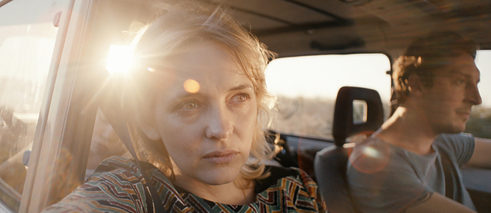Profession Film Actor
Appearance and Reality

Many young Germans find the idea of becoming a film actor very appealing. Movie stars, it would appear, live glamorous lives. Yet success in this business depends not only on talent and personality.
The director Bodo Fürneisen is a professor who teaches the acting degree course at the Film University Babelsberg “Konrad Wolf” in Potsdam, where 600 to 700 young people apply each year for one of the eight places on offer. The film university is one of twelve state-funded schools of acting in Germany. They are in particularly high demand because – unlike the 65 or so private film schools – they boast greater financial resources and excellent connections to the film industry. Among the state institutions, the Film University in Potsdam is the only place where theatre and film acting are taught on an equal footing. “Certainly nearly all universities nowadays offer film-specific modules, such as camera training courses lasting a number of weeks”, says Fürneisen. “But we are the only ones who really teach both areas equally throughout the course.”
Fürneisen also explains why: “Anyone wishing to pursue a career in film should first train as a stage actor, as this provides a solid professional foundation. Nonetheless, film acting very much has its own specifics which are defined and put to the test during the degree course.” While stage actors spend weeks engaged in rehearsals with the ensemble, jointly working on their characters, actors tend to be left to their own devices for long periods during a film shoot. There is little time for rehearsals – often there is not even enough preparation time available to get to know one’s fellow actors properly. “One key characteristic of film acting is the considerable extent to which actors are responsible themselves for developing and working on their characters.” They also need to be completely au fait with the complicated technical side of things, explains Fürneisen: “Film is also a technical medium to a disproportionately greater extent than theatre.”
German Actresses on the International Stage: Top Ten
To be sure, most German actresses dream of becoming famous beyond the borders of their home country. Only a few, however, have actually made it – film critic, Birgit Roschy, presents the ten most successful actresses.
Personality and talent are important
By the end of the seven-semester bachelor’s degree programme in Potsdam, students have thus learnt not only the basic principles of acting on stage, having completed modules in body, voice and language training, but have also acquired the specific skills they will need for a career in film acting. To this latter end, the programme features many different film projects, covering elements such as “dialogue interpretation”, “psychological character development” and “choosing a film role”, and ending with the graduation film that students make in their third year. Then there is the collaboration with students from other departments, especially those studying film directing. “Teamwork is one of the cornerstones of filmmaking, which is of course enormously fostered by this interdisciplinary approach”, explains Fürneisen.All the same, the chances of achieving the kind of success enjoyed by film and television stars are fairly slim. According to a 2010 study of the social situation of actors that was conducted by the University of Münster on behalf of the Professional Association of German Sociologists, a mere five percent of actors in Germany have gross annual earnings of 100,000 euros or more, while two thirds earn less than 30,000 euros, which is well below the national average. “A solid education such as that which we offer is one thing. But whether this will actually allow an actor to rise up and join the ranks of the stars depends on very many other factors that are difficult to influence”, says Fürneisen. Someone who has personality and the talent to show this on camera does not necessarily need formal training as an actor. “Many German actors, especially the younger generation, are cast straight from the street. And no small number of them actually go on to pursue a successful career.”
Dealing constructively with passiveness
One example is Laura Tonke (born in 1974), who received two prizes at the 2016 German Film Awards, one for the leading role in Hedi Schneider steckt fest (i.e. Hedi Schneider Is Stuck) by Sonja Heiss. She landed her first major film role when she was just 17. The director Michael Klier, a friend of her parents, was looking for a young girl to play the starring role in his 1991 film Ostkreuz. “At the time I just happened to be exactly the way Michael had imagined the character for his film”, Tonke remembers. On camera she quickly demonstrated her considerable talent and found her way into the film business. Laura Tonka never studied acting, and does not regret it to this day. Nonetheless, she does not believe that personality and talent are enough for a career in film either. “One thing a film actor really should learn is how to deal constructively with passiveness, with the passiveness that comes during the jobless phases. And also with the passiveness that is part and part of the work itself. On set, you often feel as if you are only material in the hands of the director. In filmmaking there is rarely enough time to thoroughly develop your role in the way that you can in theatre.”It was important for Tonke to experience that it is also possible to overcome this passiveness. In 2007 she joined a theatre performance group. She explains that working in a collective, switching roles between acting and directing, and the high artistic quality of the projects allowed her to view her profession from a new perspective. “I suddenly realised that nobody is forcing me to stand “only” in front of the camera and put myself at the industry’s mercy. There are periods where you are simply forgotten – times when for whatever reason you are of no interest to the film business.”
Taking a proactive stance
Theatre and film actor Johannes Suhm (born in 1977) also believes that it is essential to fully exploit one’s potential as an actor if one is to satisfy the specific requirements of the film market. A graduate of the renowned Otto Falckenberg School in Munich, he does not believe that the conditions in Germany are ideally suited to doing this, however. “US directors find it completely acceptable for actors to work closely together with a coach, intensively studying the screenplay before and during a shoot if there is no time for this on set, for example. Yet many German directors do not allow this.”There is one point on which the professor of acting Bodo Fürneisen, the established actress Laura Tonke and her not quite so well-known colleague Johannes Suhm all agree: anyone wishing to achieve success as a film actor needs to take a proactive stance rather than simply hoping to win the audience’s favour.
